牛津译林版(2019)选择性必修第一册Unit 4 Exploring poetry Integrated Skills & Extended Reading教学课件(共30张PPT)
文档属性
| 名称 | 牛津译林版(2019)选择性必修第一册Unit 4 Exploring poetry Integrated Skills & Extended Reading教学课件(共30张PPT) |
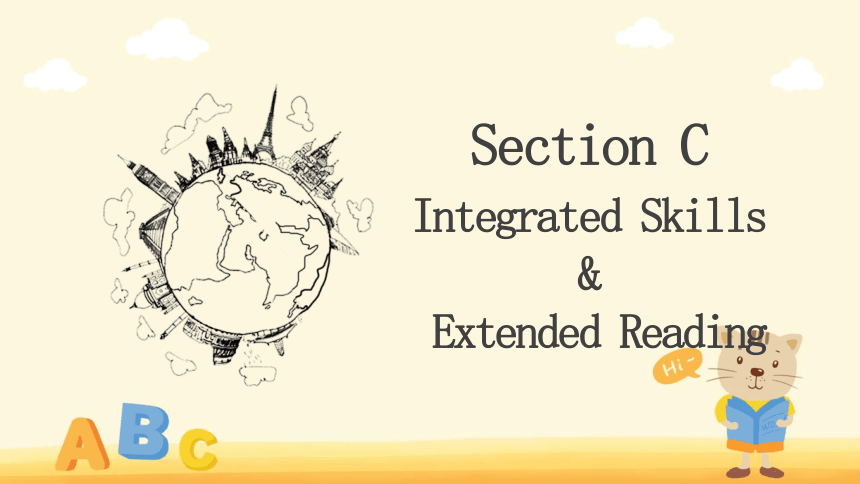
|
|
| 格式 | pptx | ||
| 文件大小 | 24.3MB | ||
| 资源类型 | 教案 | ||
| 版本资源 | 牛津译林版(2019) | ||
| 科目 | 英语 | ||
| 更新时间 | 2022-11-15 00:00:00 | ||
图片预览

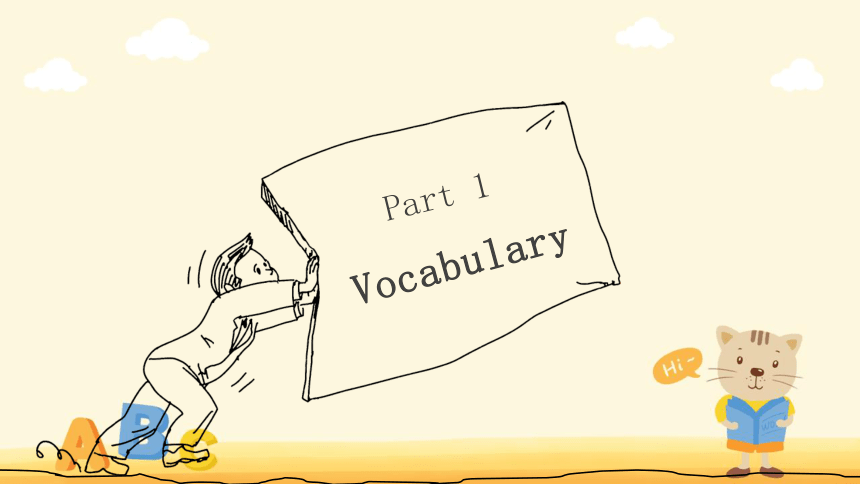
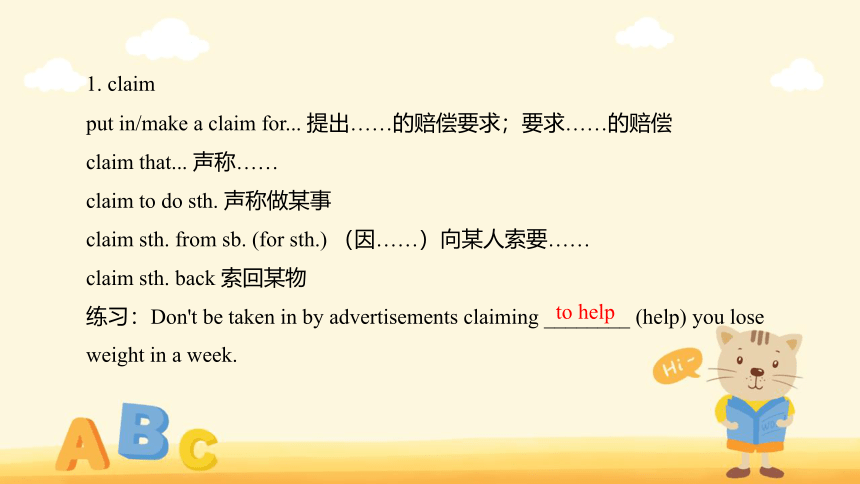
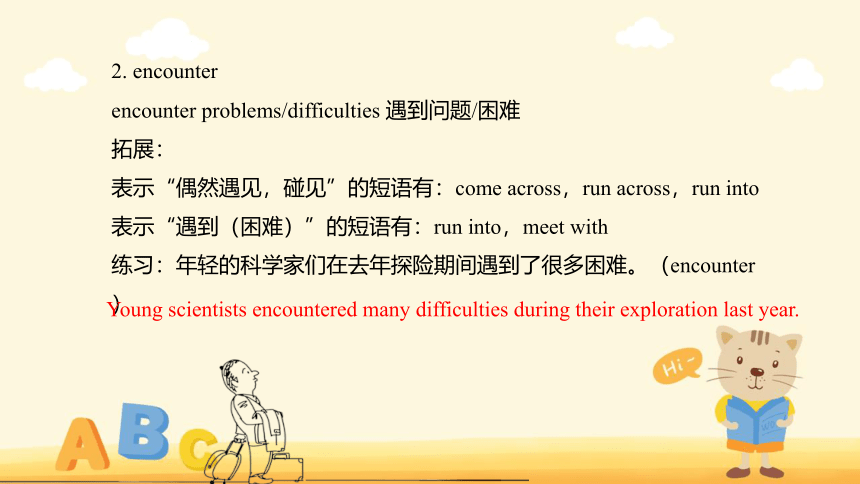
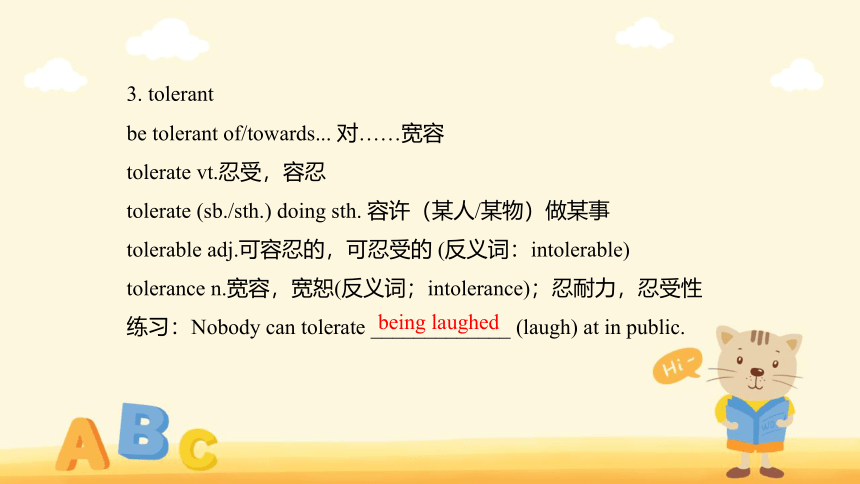
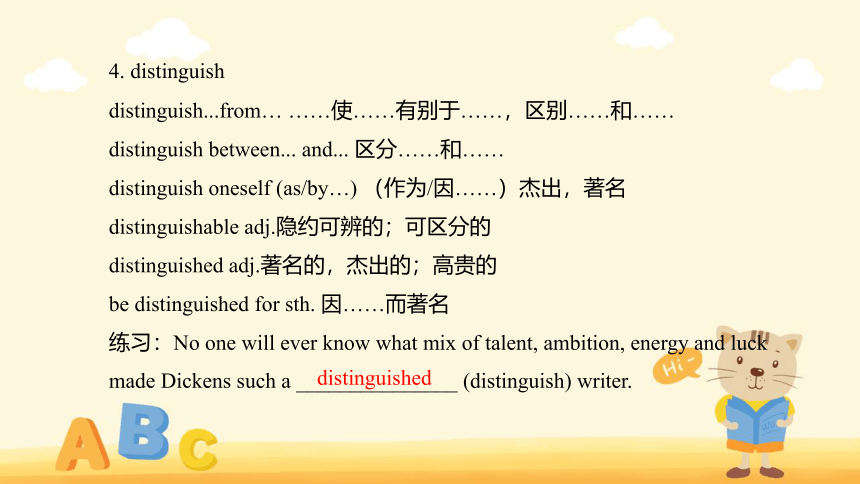
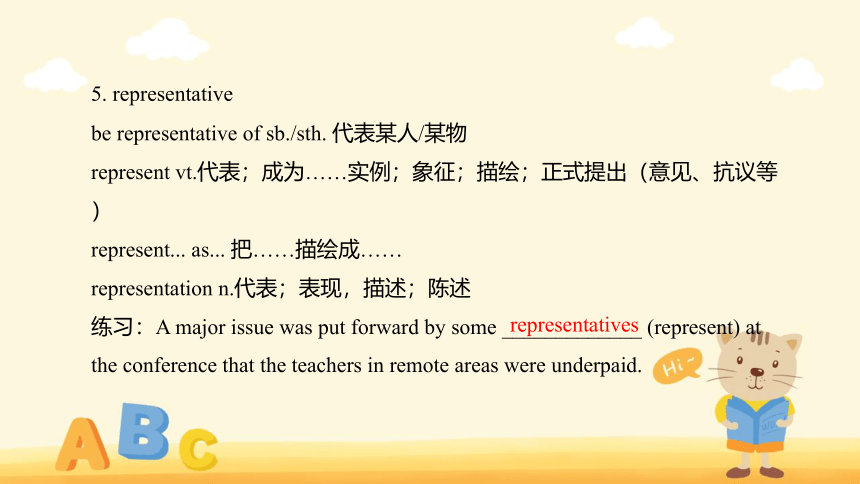
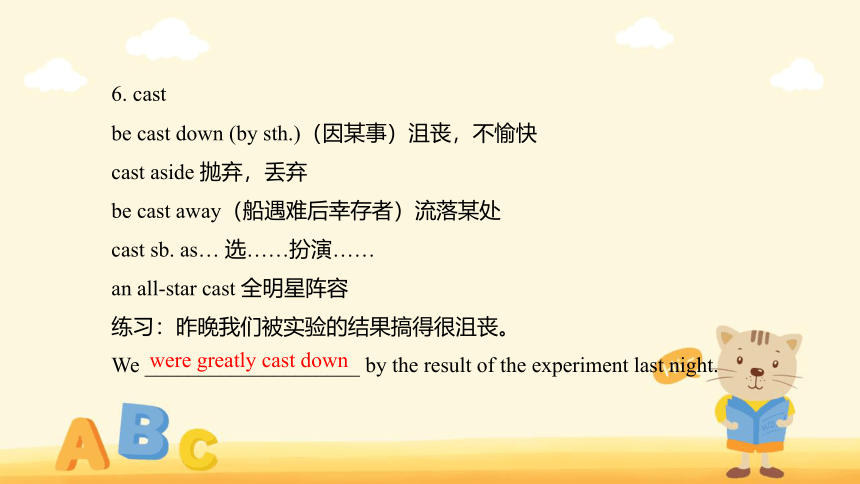
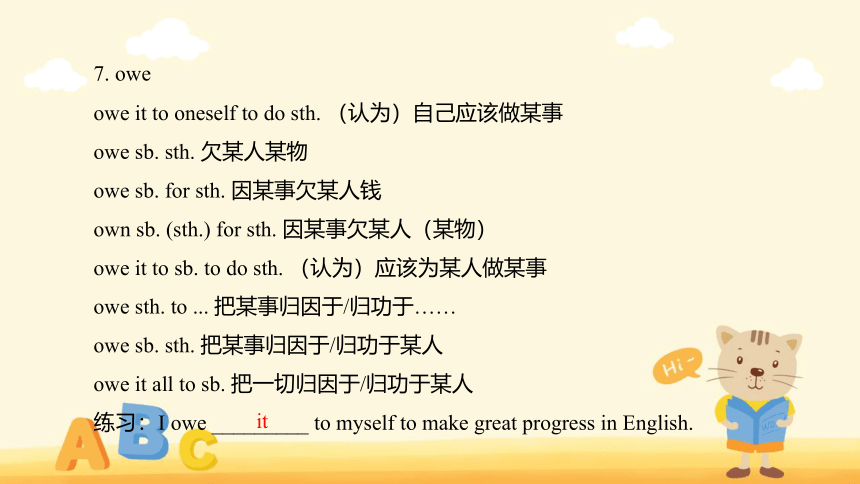
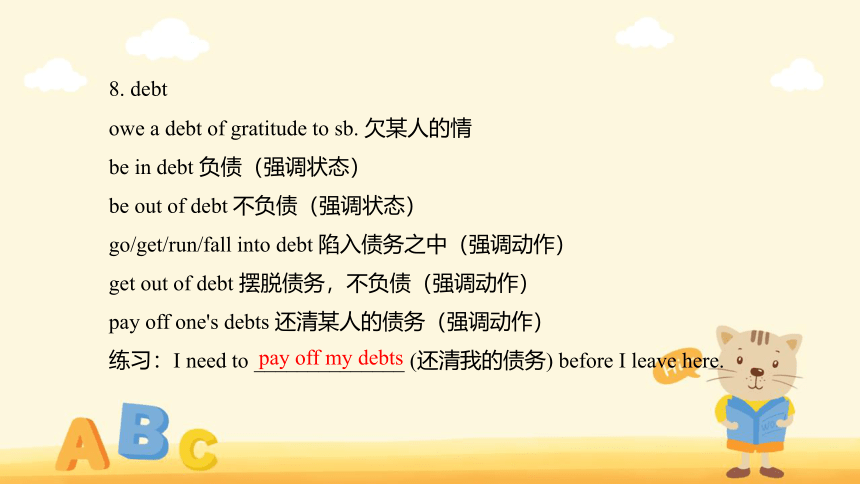
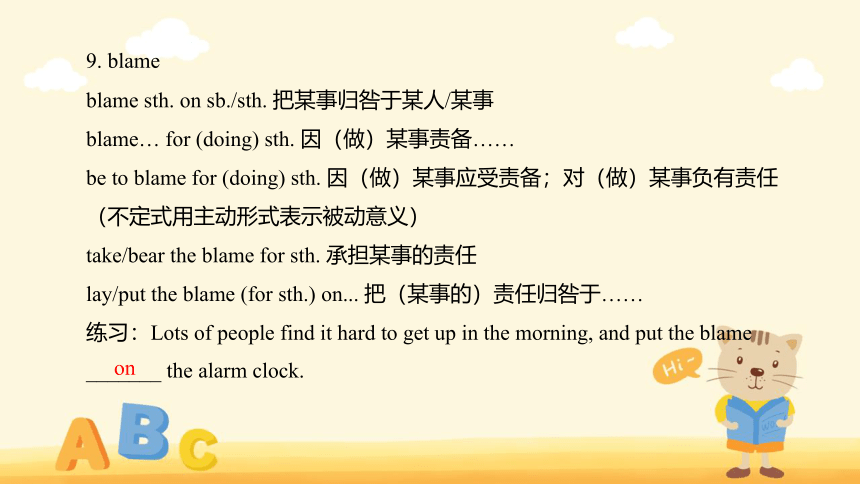
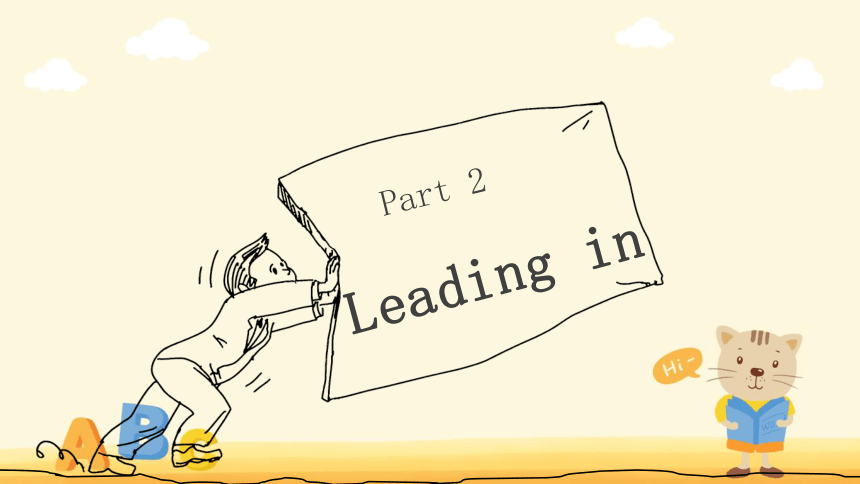
文档简介
(共30张PPT)
Section C
Integrated Skills
&
Extended Reading
Vocabulary
Part 1
1. claim
put in/make a claim for... 提出……的赔偿要求;要求……的赔偿
claim that... 声称……
claim to do sth. 声称做某事
claim sth. from sb. (for sth.) (因……)向某人索要……
claim sth. back 索回某物
练习:Don't be taken in by advertisements claiming ________ (help) you lose weight in a week.
to help
2. encounter
encounter problems/difficulties 遇到问题/困难
拓展:
表示“偶然遇见,碰见”的短语有:come across,run across,run into
表示“遇到(困难)”的短语有:run into,meet with
练习:年轻的科学家们在去年探险期间遇到了很多困难。(encounter)
Young scientists encountered many difficulties during their exploration last year.
3. tolerant
be tolerant of/towards... 对……宽容
tolerate vt.忍受,容忍
tolerate (sb./sth.) doing sth. 容许(某人/某物)做某事
tolerable adj.可容忍的,可忍受的 (反义词:intolerable)
tolerance n.宽容,宽恕(反义词;intolerance);忍耐力,忍受性
练习:Nobody can tolerate _____________ (laugh) at in public.
being laughed
4. distinguish
distinguish...from… ……使……有别于……,区别……和……
distinguish between... and... 区分……和……
distinguish oneself (as/by…) (作为/因……)杰出,著名
distinguishable adj.隐约可辨的;可区分的
distinguished adj.著名的,杰出的;高贵的
be distinguished for sth. 因……而著名
练习:No one will ever know what mix of talent, ambition, energy and luck made Dickens such a _______________ (distinguish) writer.
distinguished
5. representative
be representative of sb./sth. 代表某人/某物
represent vt.代表;成为……实例;象征;描绘;正式提出(意见、抗议等)
represent... as... 把……描绘成……
representation n.代表;表现,描述;陈述
练习:A major issue was put forward by some _____________ (represent) at the conference that the teachers in remote areas were underpaid.
representatives
6. cast
be cast down (by sth.)(因某事)沮丧,不愉快
cast aside 抛弃,丢弃
be cast away(船遇难后幸存者)流落某处
cast sb. as… 选……扮演……
an all-star cast 全明星阵容
练习:昨晚我们被实验的结果搞得很沮丧。
We ____________________ by the result of the experiment last night.
were greatly cast down
7. owe
owe it to oneself to do sth. (认为)自己应该做某事
owe sb. sth. 欠某人某物
owe sb. for sth. 因某事欠某人钱
own sb. (sth.) for sth. 因某事欠某人(某物)
owe it to sb. to do sth. (认为)应该为某人做某事
owe sth. to ... 把某事归因于/归功于……
owe sb. sth. 把某事归因于/归功于某人
owe it all to sb. 把一切归因于/归功于某人
练习:I owe _________ to myself to make great progress in English.
it
8. debt
owe a debt of gratitude to sb. 欠某人的情
be in debt 负债(强调状态)
be out of debt 不负债(强调状态)
go/get/run/fall into debt 陷入债务之中(强调动作)
get out of debt 摆脱债务,不负债(强调动作)
pay off one's debts 还清某人的债务(强调动作)
练习:I need to ______________ (还清我的债务) before I leave here.
pay off my debts
9. blame
blame sth. on sb./sth. 把某事归咎于某人/某事
blame… for (doing) sth. 因(做)某事责备……
be to blame for (doing) sth. 因(做)某事应受责备;对(做)某事负有责任(不定式用主动形式表示被动意义)
take/bear the blame for sth. 承担某事的责任
lay/put the blame (for sth.) on... 把(某事的)责任归咎于……
练习:Lots of people find it hard to get up in the morning, and put the blame _______ the alarm clock.
on
Leading in
Part 2
Are there any repeated words, rhymes or other special sound effects in this poem
In the first stanza, there is a line "Two roads diverged in a yellow wood". And in the last stanza, there is an expression "Two roads diverged in a wood". These two are almost the same.
This poem is written in rhyme. In each stanza, the last words of lines 1, 3, and 4 rhyme with each other. And the last word of line 2 rhymes with the last word of line 5. (In the first stanza, the rhymed words are: "wood" "stood" and "could"; "both" and "undergrowth". In the second stanza, the rhymed words are: "fair" "wear" and "there"; "claim" and "same". In the third stanza, the rhymed words are: "lay" "day" and "way"; "black" and "back". In the last stanza, the rhymed words are: "sigh" "I" and "by"; "hence" and "difference".
Listen again
1. What did the poet do when he faced the two roads and what might be his feeling
He looked at them one after another as far as he could and he felt undecided which to take.
2. Which road did the poet take finally and what did he think of his choice Which lines show his attitude to his choice
He took the less travelled road even though he was uncertain whether he had made the right choice. The lines that show his attitude are: "I doubted if I should ever come back." and "I shall be telling this with a sigh".
3. What image appears in your mind when you read the poem What are the words and expressions that help you see the image
I see a peaceful wood in the countryside, where few people go. I see this image from the following words and expressions: "Two roads diverged in a yellow wood", "it bent in the undergrowth", "it was grassy and wanted wear", "In leaves no step had trodden black", etc.
4. What do the two roads in the poem symbolize
The road itself symbolizes the journey of life. The image of the road forking off into two paths symbolizes the choices and opportunities we are presented with, which ultimately lead us into the unknown future that lies ahead of us.
Finish B1
1. What is Robert Frost's writing style like
Honest and direct.
2. When was "The Road Not Taken" first published
In 1915.
3. What does the image of the two roads stand for
Any choice in life.
4. What was the difficult path the poet took
Continuing to write poems even though his poetic career was not successful in the beginning.
Finish B2
1963
four
the human condition
long walks
the wrong one/path
the difficult path
Discussion
1. What message do you think the poem is trying to get across to readers
"The Road Not Taken" suddenly presents the poet and the reader with a dilemma. The central message is that, in life, we are often presented with choices. When making a choice, one is required to make a decision. Viewing a choice as a fork in a path, it becomes clear that we can only choose one direction or another, but not both. Any person who has made a decisive choice will agree that it is human nature to contemplate the "What if ..." of the choice you did not make. But who knows what the future holds down the road The poet implies that, when he is older, he might look back at this turning point in his life, the morning he took the road less travelled, because taking that particular route completely altered his way of being.
2. Have you ever been in a similar situation Connect your personal experience with the poem.
Yes. Standing at a crossroad, with four roads to choose from and with limited knowledge on where I should go, I don’t really know where a road will lead me until I take it. The only thing I have power over is the decisions that I will make, and how I will react to different situations.
如何写诗歌评论
Part 3
诗歌饱含着作者的思想感情与想象,语言凝练而形象性强,具有鲜明的节奏、和谐的音韵,富于音乐美。
诗评,即对诗歌的评论。写诗评时通常包含三个步骤:首先,简要介绍诗作和诗人;其次,分析和评价这首诗的艺术特征,如它的韵律、形象、比喻手法、点睛之笔等;最后,分析作者想要表达的情感,给出你对这首诗的理解,在这一部分最好结合个人经历或情感。
常用表达
①The poem was written in 1780, when the writer was in his fifties.
②The writer wrote this poem for his friend, who was leaving for...
③This poem conveys the author's sadness at being far from his home and family.
④Li Bai must be one of the most famous poets in the world.
⑤His poems enjoy great popularity at home and abroad.
⑥The mood of this poem is quite pessimistic because the author is saying goodbye to his friend, not knowing how long he will be away.
⑦Many of his poems reflect the history and culture, giving you vivid pictures of people's life hundreds of years ago.
⑧The poem uses simple language and has strong rhythm, making it easy to learn and recite.
⑨The line written by Wang Bo "A bosom friend afar brings a distant land near" wipes away the sorrow of departure and has become a famous saying to express friendship.
⑩You need to have a brief understanding of the history of the Tang Dynasty to appreciate the poem well.
练习
Part 4
阅读下面美国诗人Ralph Emerson 的诗歌A Nation's Strength 节选,写一篇诗评,发表在校英文报上。内容应包括:
1.诗歌的作者;
2.简要介绍这首诗的内容;
3.这首诗对你的启发。
注意:词数80左右。
A Nation's Strength
Not gold, but only men can make
A people great and strong;
Men who for truth and honor's sake
Stand fast and suffer long.
Brave men who work while others sleep,
Who dare while others fly…
They build a nation's pillars deep
And lift them to the sky.
The poem A Nation's Strength was written by American poet Ralph Emerson. In this poem, Emerson is full of praise for the backbone of his nation, whose people, for the sake of the truth and honor, fight and work selflessly and fearlessly.
From my perspective, these national heroes really deserve our respect. I am determined to devote my whole being to my country and I am convinced that with the dedication of many young people, our country is sure to become more prosperous.
Thank you
Section C
Integrated Skills
&
Extended Reading
Vocabulary
Part 1
1. claim
put in/make a claim for... 提出……的赔偿要求;要求……的赔偿
claim that... 声称……
claim to do sth. 声称做某事
claim sth. from sb. (for sth.) (因……)向某人索要……
claim sth. back 索回某物
练习:Don't be taken in by advertisements claiming ________ (help) you lose weight in a week.
to help
2. encounter
encounter problems/difficulties 遇到问题/困难
拓展:
表示“偶然遇见,碰见”的短语有:come across,run across,run into
表示“遇到(困难)”的短语有:run into,meet with
练习:年轻的科学家们在去年探险期间遇到了很多困难。(encounter)
Young scientists encountered many difficulties during their exploration last year.
3. tolerant
be tolerant of/towards... 对……宽容
tolerate vt.忍受,容忍
tolerate (sb./sth.) doing sth. 容许(某人/某物)做某事
tolerable adj.可容忍的,可忍受的 (反义词:intolerable)
tolerance n.宽容,宽恕(反义词;intolerance);忍耐力,忍受性
练习:Nobody can tolerate _____________ (laugh) at in public.
being laughed
4. distinguish
distinguish...from… ……使……有别于……,区别……和……
distinguish between... and... 区分……和……
distinguish oneself (as/by…) (作为/因……)杰出,著名
distinguishable adj.隐约可辨的;可区分的
distinguished adj.著名的,杰出的;高贵的
be distinguished for sth. 因……而著名
练习:No one will ever know what mix of talent, ambition, energy and luck made Dickens such a _______________ (distinguish) writer.
distinguished
5. representative
be representative of sb./sth. 代表某人/某物
represent vt.代表;成为……实例;象征;描绘;正式提出(意见、抗议等)
represent... as... 把……描绘成……
representation n.代表;表现,描述;陈述
练习:A major issue was put forward by some _____________ (represent) at the conference that the teachers in remote areas were underpaid.
representatives
6. cast
be cast down (by sth.)(因某事)沮丧,不愉快
cast aside 抛弃,丢弃
be cast away(船遇难后幸存者)流落某处
cast sb. as… 选……扮演……
an all-star cast 全明星阵容
练习:昨晚我们被实验的结果搞得很沮丧。
We ____________________ by the result of the experiment last night.
were greatly cast down
7. owe
owe it to oneself to do sth. (认为)自己应该做某事
owe sb. sth. 欠某人某物
owe sb. for sth. 因某事欠某人钱
own sb. (sth.) for sth. 因某事欠某人(某物)
owe it to sb. to do sth. (认为)应该为某人做某事
owe sth. to ... 把某事归因于/归功于……
owe sb. sth. 把某事归因于/归功于某人
owe it all to sb. 把一切归因于/归功于某人
练习:I owe _________ to myself to make great progress in English.
it
8. debt
owe a debt of gratitude to sb. 欠某人的情
be in debt 负债(强调状态)
be out of debt 不负债(强调状态)
go/get/run/fall into debt 陷入债务之中(强调动作)
get out of debt 摆脱债务,不负债(强调动作)
pay off one's debts 还清某人的债务(强调动作)
练习:I need to ______________ (还清我的债务) before I leave here.
pay off my debts
9. blame
blame sth. on sb./sth. 把某事归咎于某人/某事
blame… for (doing) sth. 因(做)某事责备……
be to blame for (doing) sth. 因(做)某事应受责备;对(做)某事负有责任(不定式用主动形式表示被动意义)
take/bear the blame for sth. 承担某事的责任
lay/put the blame (for sth.) on... 把(某事的)责任归咎于……
练习:Lots of people find it hard to get up in the morning, and put the blame _______ the alarm clock.
on
Leading in
Part 2
Are there any repeated words, rhymes or other special sound effects in this poem
In the first stanza, there is a line "Two roads diverged in a yellow wood". And in the last stanza, there is an expression "Two roads diverged in a wood". These two are almost the same.
This poem is written in rhyme. In each stanza, the last words of lines 1, 3, and 4 rhyme with each other. And the last word of line 2 rhymes with the last word of line 5. (In the first stanza, the rhymed words are: "wood" "stood" and "could"; "both" and "undergrowth". In the second stanza, the rhymed words are: "fair" "wear" and "there"; "claim" and "same". In the third stanza, the rhymed words are: "lay" "day" and "way"; "black" and "back". In the last stanza, the rhymed words are: "sigh" "I" and "by"; "hence" and "difference".
Listen again
1. What did the poet do when he faced the two roads and what might be his feeling
He looked at them one after another as far as he could and he felt undecided which to take.
2. Which road did the poet take finally and what did he think of his choice Which lines show his attitude to his choice
He took the less travelled road even though he was uncertain whether he had made the right choice. The lines that show his attitude are: "I doubted if I should ever come back." and "I shall be telling this with a sigh".
3. What image appears in your mind when you read the poem What are the words and expressions that help you see the image
I see a peaceful wood in the countryside, where few people go. I see this image from the following words and expressions: "Two roads diverged in a yellow wood", "it bent in the undergrowth", "it was grassy and wanted wear", "In leaves no step had trodden black", etc.
4. What do the two roads in the poem symbolize
The road itself symbolizes the journey of life. The image of the road forking off into two paths symbolizes the choices and opportunities we are presented with, which ultimately lead us into the unknown future that lies ahead of us.
Finish B1
1. What is Robert Frost's writing style like
Honest and direct.
2. When was "The Road Not Taken" first published
In 1915.
3. What does the image of the two roads stand for
Any choice in life.
4. What was the difficult path the poet took
Continuing to write poems even though his poetic career was not successful in the beginning.
Finish B2
1963
four
the human condition
long walks
the wrong one/path
the difficult path
Discussion
1. What message do you think the poem is trying to get across to readers
"The Road Not Taken" suddenly presents the poet and the reader with a dilemma. The central message is that, in life, we are often presented with choices. When making a choice, one is required to make a decision. Viewing a choice as a fork in a path, it becomes clear that we can only choose one direction or another, but not both. Any person who has made a decisive choice will agree that it is human nature to contemplate the "What if ..." of the choice you did not make. But who knows what the future holds down the road The poet implies that, when he is older, he might look back at this turning point in his life, the morning he took the road less travelled, because taking that particular route completely altered his way of being.
2. Have you ever been in a similar situation Connect your personal experience with the poem.
Yes. Standing at a crossroad, with four roads to choose from and with limited knowledge on where I should go, I don’t really know where a road will lead me until I take it. The only thing I have power over is the decisions that I will make, and how I will react to different situations.
如何写诗歌评论
Part 3
诗歌饱含着作者的思想感情与想象,语言凝练而形象性强,具有鲜明的节奏、和谐的音韵,富于音乐美。
诗评,即对诗歌的评论。写诗评时通常包含三个步骤:首先,简要介绍诗作和诗人;其次,分析和评价这首诗的艺术特征,如它的韵律、形象、比喻手法、点睛之笔等;最后,分析作者想要表达的情感,给出你对这首诗的理解,在这一部分最好结合个人经历或情感。
常用表达
①The poem was written in 1780, when the writer was in his fifties.
②The writer wrote this poem for his friend, who was leaving for...
③This poem conveys the author's sadness at being far from his home and family.
④Li Bai must be one of the most famous poets in the world.
⑤His poems enjoy great popularity at home and abroad.
⑥The mood of this poem is quite pessimistic because the author is saying goodbye to his friend, not knowing how long he will be away.
⑦Many of his poems reflect the history and culture, giving you vivid pictures of people's life hundreds of years ago.
⑧The poem uses simple language and has strong rhythm, making it easy to learn and recite.
⑨The line written by Wang Bo "A bosom friend afar brings a distant land near" wipes away the sorrow of departure and has become a famous saying to express friendship.
⑩You need to have a brief understanding of the history of the Tang Dynasty to appreciate the poem well.
练习
Part 4
阅读下面美国诗人Ralph Emerson 的诗歌A Nation's Strength 节选,写一篇诗评,发表在校英文报上。内容应包括:
1.诗歌的作者;
2.简要介绍这首诗的内容;
3.这首诗对你的启发。
注意:词数80左右。
A Nation's Strength
Not gold, but only men can make
A people great and strong;
Men who for truth and honor's sake
Stand fast and suffer long.
Brave men who work while others sleep,
Who dare while others fly…
They build a nation's pillars deep
And lift them to the sky.
The poem A Nation's Strength was written by American poet Ralph Emerson. In this poem, Emerson is full of praise for the backbone of his nation, whose people, for the sake of the truth and honor, fight and work selflessly and fearlessly.
From my perspective, these national heroes really deserve our respect. I am determined to devote my whole being to my country and I am convinced that with the dedication of many young people, our country is sure to become more prosperous.
Thank you
同课章节目录
- Unit 1 Food matters
- Welcome to the unit
- Reading
- Grammar and usage
- Integrated skills
- Extended reading
- Project
- Unit 2 The Universal Language
- Welcome to the unit
- Reading
- Grammar and usage
- Integrated skills
- Extended reading
- Project
- Unit 3 The art of painting
- Welcome to the unit
- Reading
- Grammar and usage
- Integrated skills
- Extended reading
- Project
- Unit 4 Exploring poetry
- Welcome to the unit
- Reading
- Grammar and usage
- Integrated skills
- Extended reading
- Project
